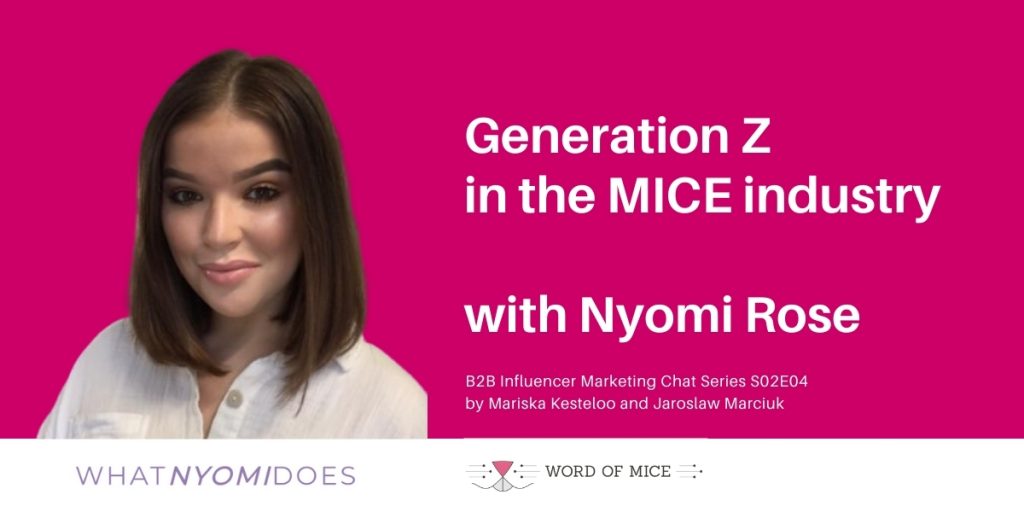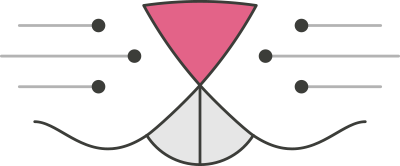Hear Me, See Me, Include Me
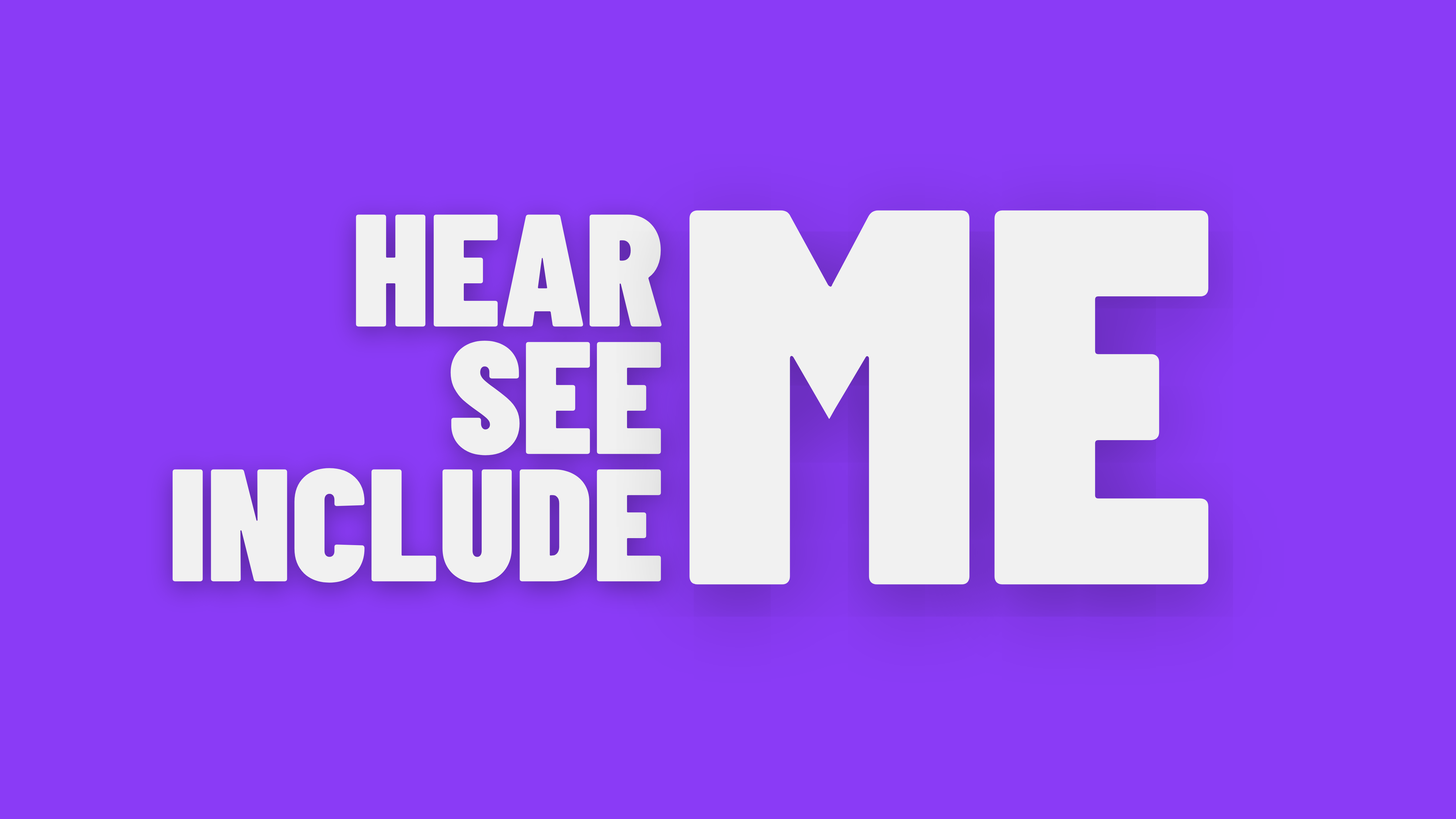
What I absolutely have to tell you about is the video Hear Me, See Me, Include Me. From the moment I first saw it I couldn’t stop thinking about it. Its creator Megan Strahle, who has been working in the MICE industry for many years and is primarily focused on sustainability in the meetings industry. Mariska and I had the opportunity to work together with Megan, and we both never noticed that Megan had a disability.
Only after watching her video, I really understood how important her voice is. I don’t want to summarise the whole video and I encourage you to watch it for yourself, but do want to point out a few things that particularly caught my attention.
Hear Me, See Me, Include Me
In the video Megan talks about invisible disabilities, disabilities that at first sight can lead to misunderstandings, negative perceptions or judgments of a person. Just because a disability is not visible does not mean it is not there.
As Megan says, people with disabilities face new limitations in this pandemic era. We all know that when meeting online, the element of human contact is missing. Networking on Zoom, online seminars, virtual trade shows and conferences, hybrid congresses have opened up new opportunities to participate in global events, but have also paradoxically created new barriers for people with disabilities.
For example, hearing and listening. This was particularly memorable for me. “Hearing isn’t just what happens, hearing is something I have to work on” – Megan syas.
You have to be able to see the person speaking and read their lips. Unfortunately, wearing masks also took away the ability to receive the content correctly. Megan’s film can be watched here below.
Good examples and things could be done way better
The Zoom and Clubhouse apps are two examples of how certain things could be improved for people with disabilities. Zoom did not have free subtitles for app users, unli. e the Google Meet, Microsoft Teams and Skype platforms. A significant change was only brought due to a lawsuit. Lawsuit Against Zoom Claims Closed Captions Surcharge Discriminates Against Deaf Users.
On the other hand, a very good example on how to prepare for a virtual event and taking into account the needs of people with disabilities was TEDx London Women`s Event 2021.
In the video, the author shares tips on how to improve the organisation of events in closed spaces and for online events. Additionally, you can find out what employers can do to make work easier for disabled employees and on how to improve communication. Everyone wants to be part of groups, local communities and the events. And these rights should not be taken away.
Over a week ago I created and shared this video. I had fully expected five people maximum (including my mom!) would watch it. The response has been overwhelming & with my dissertation due date looming, I didn’t have the time to fully realize the impact (1) https://t.co/PTEPmEDUX2
— Meg Strahle (she/her) (@megstrahle) August 31, 2021
Disability in the world #WeThe15
The Tokyo 2020 Summer Paralympic Games (24 August to 5 September 2021) just finished in Tokyo. Many countries were represented by people with disabilities. The athletes won many medals, gold, silver or bronze and brought us touching moments and many reasons to be proud. What all athletes and disabled people have in common, however, is the great achievement of fighting their limitations and weaknesses every day.
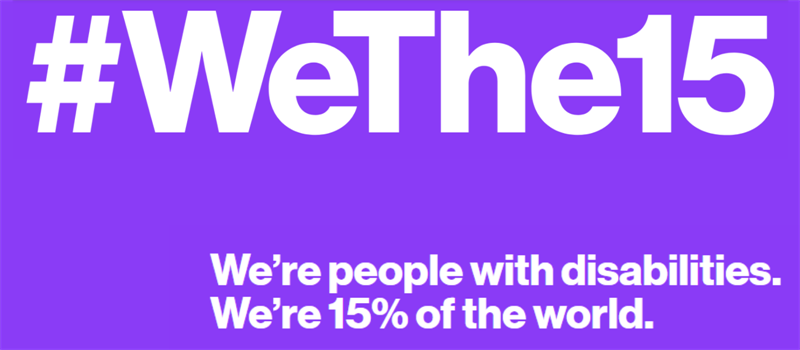
Do you know how many people live with a disability in the world? People with disabilities are 15% of the world’s population. The #WeThe15 social campaign is asking attention for people with a disability. I encourage you to watch the video on the official Youtube channel of the International Paralympic Committee.
What can you do?
Do we have important challenges for the MICE industry in the coming months and for upcoming planned real, hybrid and virtual events? Yes, we definitely have.
Can we also take into account the needs and expectations of people with disabilities to make these events more welcoming and accessible to a wider audience? Yes, we can! People with disabilities are also part of your target audience!
Let each of us think about what we can change and improve. Sometimes you really don’t need much.
It starts with being aware and listening to the suggestions of people with disabilities. Let’s start by spending 30 minutes watching the film Hear Me, See Me, Include Me.
Jaro(slaw) Marciuk. Thank you Meg for sharing your story.
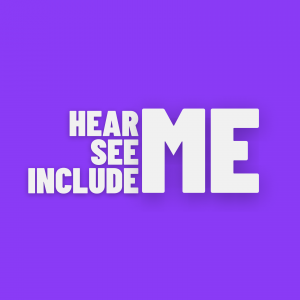
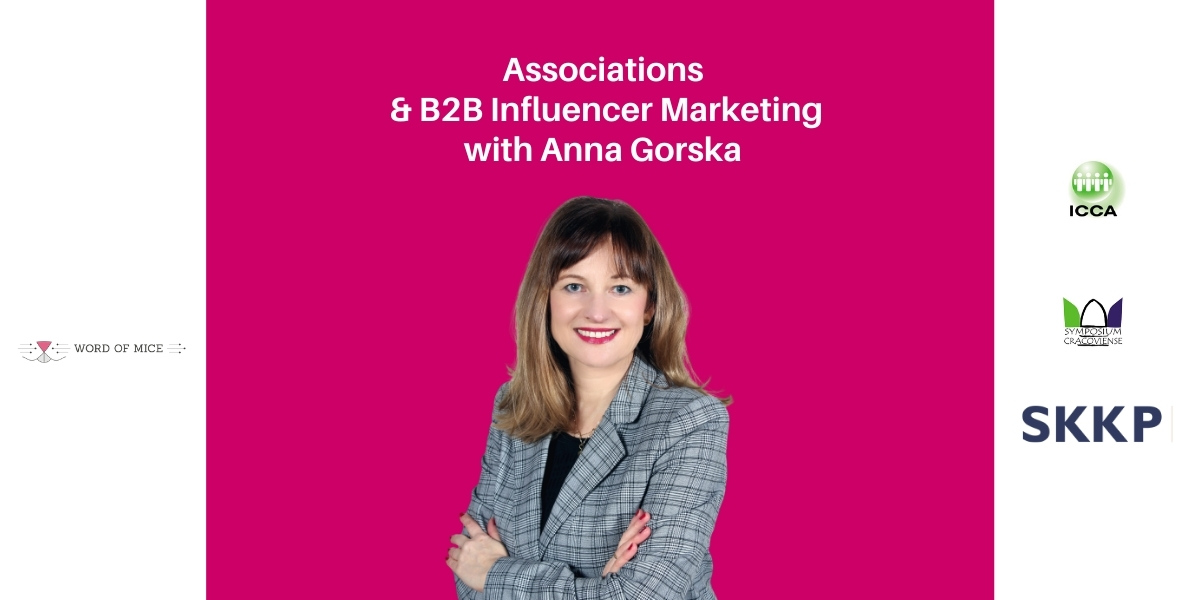
How associations can benefit from social media? – the interview with Anna Gorska
Welcome to the second edition of the B2B influencer marketing chat series. Today, we have a great guest from ICCA and associations world in our podcast. Let`s dive into the discussion with Anna Gorska and find out how international associations can benefit from social media and marketing.
Who is Anna Gorska
Anna Gorska has been involved in the meetings industry for over 20 years. Since May 2019 she is part of the Advisory Board in the leading Polish association called PCO Symposium Cracoviense, where she is responsible for relations with the international associations. In March 2019 Anna became the Vice President of the SKKP Polish Conference & Congress Association. She is a passionate lecturer at universities promoting the importance of the meetings industry to the young generation. In October 2020 she was elected as a Board member for ICCA (International Congress and Convention Association). Anna was also chairing the ICCA Central European Chapter for 6 years.
We talked with Anna Gorska about:
- News from the World; an initiative that was created during the lockdown to keep in touch with associations.
- The 59th ICCA Congress that was held in November 2020 and gathered more than 1500 participants online.
- The role of the different social media channels; why Facebook is more popular in Poland than LinkedIn for associations?
Have you missed the live episode with Anna Gorska?
In case you missed our live session with Anna Gorska, listen to our conversation on your favorite podcast channel. We uploaded the whole interview to the following podcast channels:
Do you prefer reading over listening? You can read most of our conversation with Anna Górska below. Enjoy listening and reading.
59th ICCA Congress 2020
Mariska: It`s clear from your CV and from your background that you have a huge passion for the MICE industry. So I can say that you are true advisor or ambassador and perhaps even better said, a true influencer for the destination of Poland. I suppose the majority of the readers know ICCA, but can you share something about your role in ICCA and also about the ICCA Congress that took place in 2020? Can you share any insights why this congress was also so special?
Anna: Yes, of course. ICCA means International Conference and Congress Association. Right now, ICCA has over 1000 members from all over the world. In my opinion it is the most important organisation dealing with the meetings industry in the world right now. ICCA organises its’ congress every year and it takes place in a different part of the world every year. And in fact, every year, many cities try to bid for it to be the host of this event, because it’s a very prestigious event. So every year ICCA Congress gathers up to 1000 people from the meetings industry and from the top management of the members.
This year, the title of the congress was “Transforming Events Together“. It was scheduled to take place in Kaohsiung in Taiwan. But due to the COVID, the Board of ICCA decided to organse it for the first time ever, in a different form, in a hybrid format. So besides Kaohsiung, there were seven other regional hubs chosen in a different parts of the world, where the members could meet face to face. For example, in Europe, we had hubs in Luxembourg, and Malaga. The hubs were chosen so that delegates from all over the world didn’t have to travel to Asia, and could choose the nearest hub to their destination.
The attendees also had option to participate virtually. And thanks to that, the event hit a record number of attendees. There were 1500 participants.
ICCA also offered a six week educational program before the actual start of the congress. So for the registered participants, there were sessions every day on the topics like storytelling, macro and micro trends. And the sessions are still available on demand until the end of the 2020. So I think it’s the future of the meetings – the hybrid way, because it gives you an opportunity to participate either face to face or virtually, in case when you don’t have time, money or other sources to travel far away.
The 2021 ICCA Congress wil be held Cartagena, Colombia. So we all hope that we will be able to travel freely until November 2021.
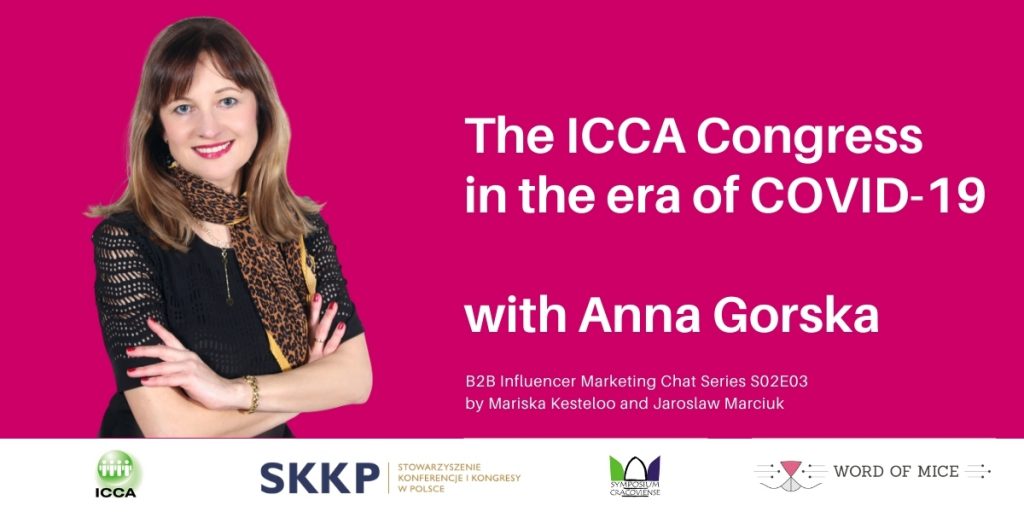
Challenges for associations in the era of Covid-19
Mariska: You’re also very passionate about education. You were telling also in your introduction that you’re teaching students, so I think education is very important also for the ICCA community. So I hope that there will be more education about associations, about bidding or any other related topics. So I think it’s a great way forward and I’m really curious how the conference or in what way the ICCA congress in 2021 will take place in South America in Cartagena.
You are very passionate about associations. Associations in our industry are also known as an audience that is difficult to reach, difficult to get in touch with. You have a lot of experience about the association market. Can you give any insights about this particular market, about this particular audience?
Anna: Yes. First of all, I think that for many associations the annual congress is the main source of their income. So, during the COVID-19 pandemic crisis, when the event has to be canceled, or postponed, it’s a problem for the association. In many cases, the leaders of the associations work voluntarily. So they have their own business issues to deal with, and it’s hard to concentrate for them on the associations market. I think this is the biggest challenge all associations are facing now.
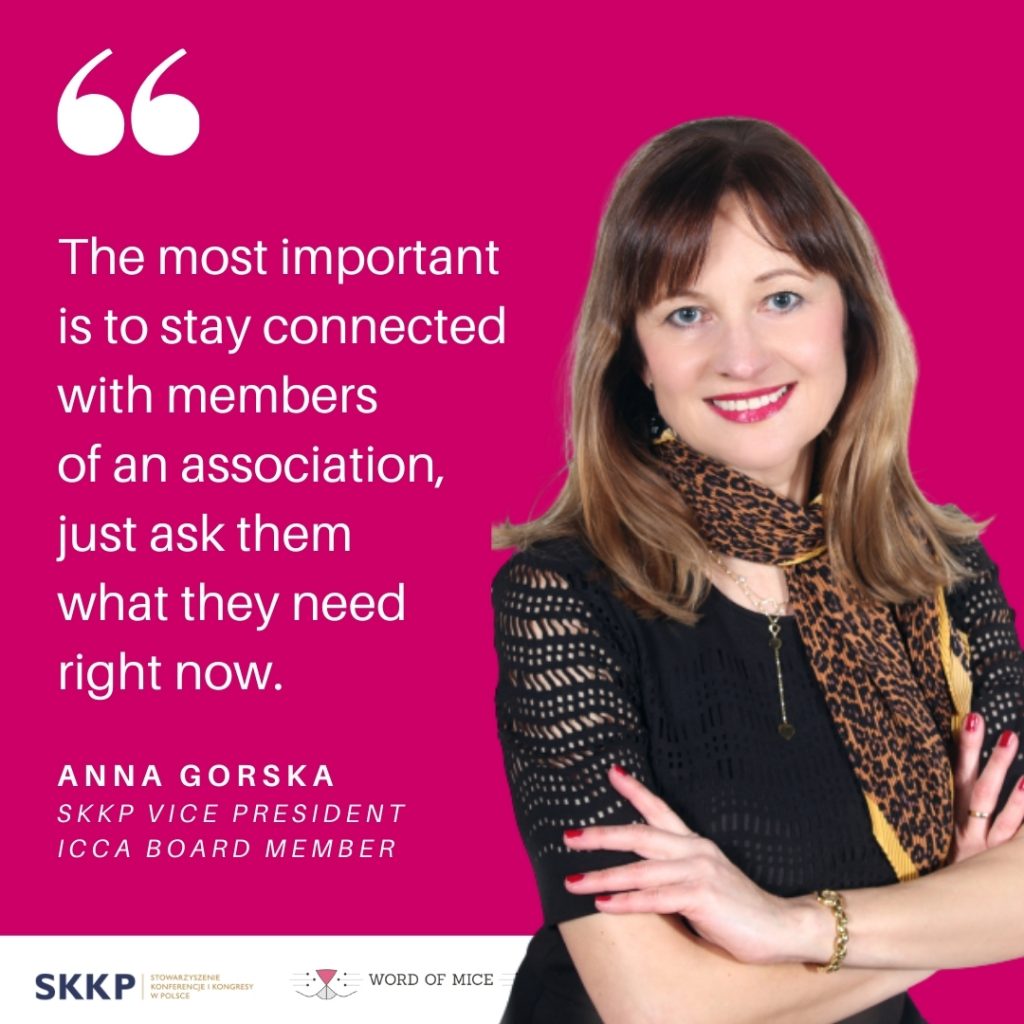
And of course, uncertainty is the main problem, we don’t know when we’ll be able to meet face to face again, and travel again freely. So this is also a very big challenge. Others are like remote work and organise virtual meetings for associations. Others do not have experience and digital skills. So I think it would be reasonable for them outsource this and use sometimes experience of the PCOs to help them organise virtual meetings.
In my opinion, right now, the most important is to stay connected with the members, and to offer them an open communication and just examine their needs. Just ask them what they need right now. Because all of our priorities have changed. And what was good for the members last year, probably is not good right now. We need to learn to adopt to the members needs. I think it’s the most important right now for all national, for medical and industry associations.
An academy for meeting planners and event professionals
Mariska: I think you’re absolutely right, associations have a very fragile structure. And like you said, they’re based on volunteers, those volunteers perhaps may run their own company or employees. Also there has a lot of things changed, we’re now working from home, perhaps also personal situations have changed. And your working environment has changed. So we are facing a lot of challenges, of course, and it has a huge effect on the on the quality and also on the role of associations.
And the second, what you mentioned is the online experience. Yes, if you are working as a volunteer in an association, that doesn’t mean that you’re directly an online event strategist or online event planner. And also, as we’re living such an ever changing environment, what we need now today is perhaps different than we would need in a week or in a month’s time. So it is really a very, very challenging, not only for us, and as we’re speaking here, a very challenging world. But of course, yeah, an ever changing environment. And you say you reach out to members, you get the advice to reach out to your members. And just pick up the phone and call them or send them a message. Do you have any other advice? How can you stay in touch with your members or people that are related or connected with associations?
Anna: I can give you an example of the project we introduced in our Polish Conference and Congress Association (SKKP). The main goal of SKKP is to educate the members. And last year we introduced a project called SKKP Academy.
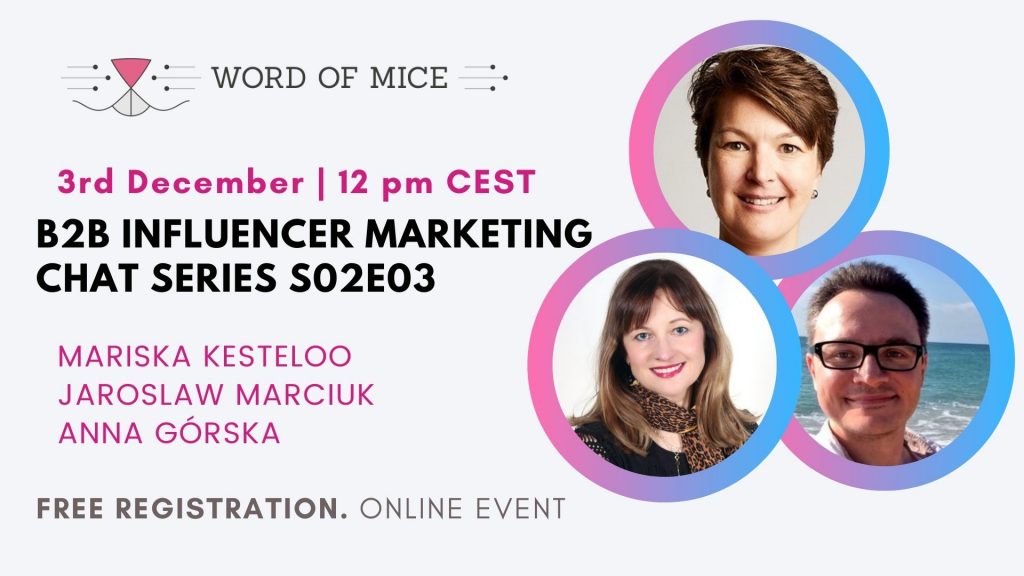
SKKP News from the World
But, of course in March this year, it was obvious that we could not organise any face to face trainings or educational products. So we introduced something new, the project called SKKP News from the World. It is a series of articles in which we write about case studies, reports, new promotional campaigns, showing how the world is reacting on this unusual and unexpected situation. And we make it available to our members and to other MICE industry representatives in Poland. The goal was to help the members to deal with an unexpected crisis by showing them the good examples from the world. Because we all know that information is crucial to conduct right decisions and to create recovery plans. It also allows members to react quickly and to implement changes in their strategies.
The project was very simple, the articles were spread throughout the social media and received a very positive feedback. The Polish MICE industry media also helped us and they distributed articles through their channels on social media, and in their newsletters. The project was also one of the finalists in the international awards, organised by association executives. We know that MICE professionals read it, because I can see how they use it in their campaigns, how they use it when they speak to others, so it’s very positive for us. And it motivates me even more. And I decided to continue the project also next year, and keep on writing the articles.
Mariska: Could you please share with us, because you’re saying you’re sharing case studies or articles. Were these articles also about associations and case studies from MICE companies? Can you say something about the type of content that you shared within that new initiative?
Anna: Yes, we shared the reports that appeared in the MICE industry. For example we distributed the reports issued by ICCA, or the other associations. And we also wrote about good positive examples of the different campaigns. I can share an example of the campaign in England, it’s called, ‘It’s time to meet again‘. During the campaign the employees of the industry took pictures with their smartphones, in their workplaces. And then they share it through their own social media channels. So to show that positive and personal way of how to organise event in their region.
Mariska: This is important for anyone who’s creating a new initiative or building up a community. So you really concentrate on content from the industry, from the meetings and events industry, and to share it with your members. You didn’t share any information from outside the meeting and events industry?
Anna: No, we share mainly information of the meetings industry. We read articles in the international newspapers, social media, different channels, and we choose what in our opinion could be important.
How to share news with your audience?
Mariska: You know the challenges of your audience, that you were the right person to choose the right articles that were relevant or could be informative for your audience. Also, how did you share those articles with your audience? Did you create a newsletter? Did you create a company page on Facebook? Or what platform did you use, and how frequently did you share the news with your audience?
Anna: Okay, so first, we started to write articles twice a week. And right now, I write articles once a week. We have created the webpage of SKKP section called ‘News of the world’. Other than that I posted on my personal Facebook profile and LinkedIn profile. As SKKP we also distributed the content on our Facebook page. And as I can see the others also share our articles on their personal profiles. The Polish MICE media such as: Meeting Planner, Think MICE and MICE Poland, also joined our initiative. So all these actions give an opportunity for the wider audience to read about it.
There is so much information and not many people have the time to read it all.So this is helpful as that what we choose, of course, from our point of view, what is really important, and share it, so they the have real knowledge all in one place.
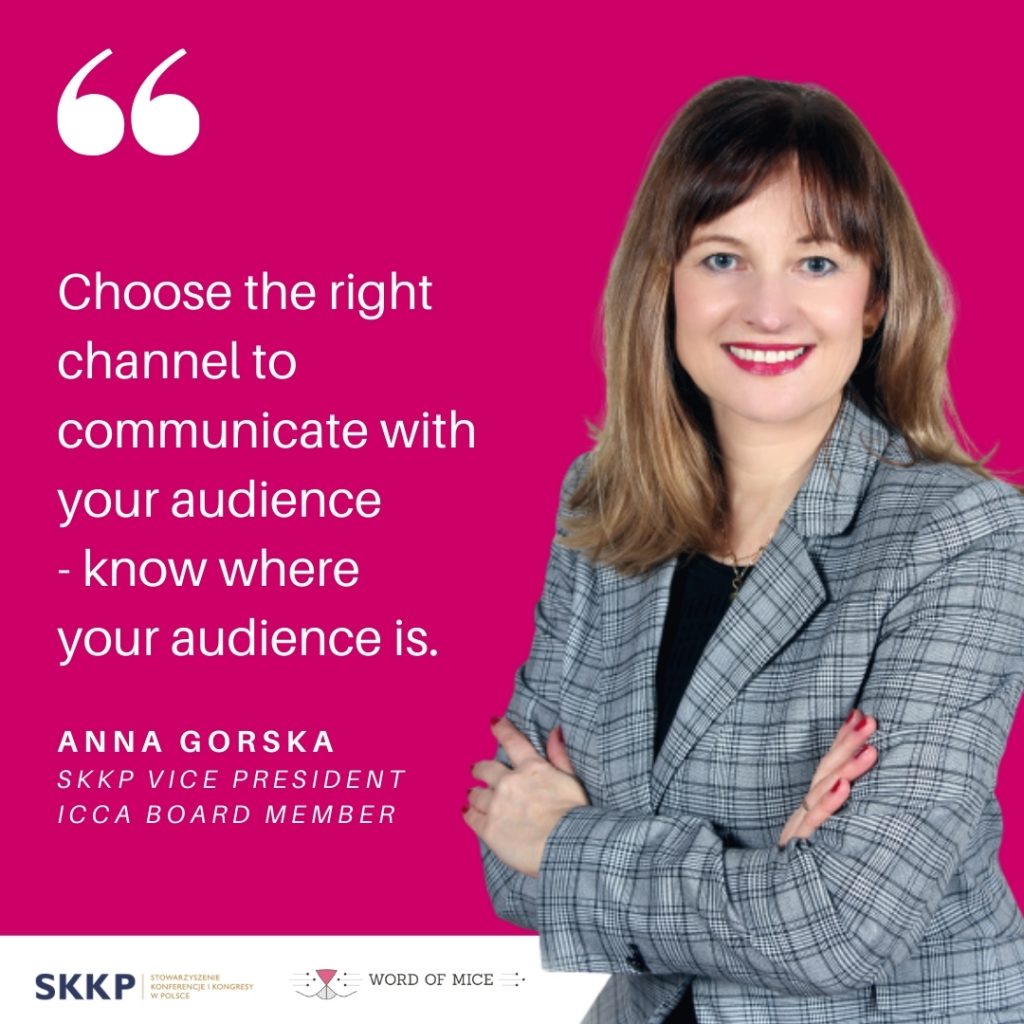
Facebook or LinkedIn?
Mariska: Yeah, but I think it’s important because you have so many years of experience in the industry. You know what your audience needs, and they trust you as a person. So therefore, I think you are the right person to choose that information and to share it because you are authentic, you are trustworthy, and I would say the influencer within the world of associations. And going back, because you shared the content also on your private channels and on your Facebook and on your LinkedIn. And what is then your preferred channel, if you would choose between LinkedIn and Facebook? Or where did you get more reactions on Facebook or on the LinkedIn page?
Anna: Well definitely on Facebook, we get more reactions. And I use my personal Facebook profile only for business related matters. You know, I don’t use it for private reasons. I mean sometimes I do, but only when I want to promote the destination Poland. So I don’t show the birthdays of my children. I see that in Poland, Facebook, at least for the industry associations as MPI Poland Chapter, SKKP, or SITE Poland, is used more frequently than LinkedIn. And although I also share the articles on the LinkedIn, I see much more reaction on Facebook, and also much more shares on Facebook than on LinkedIn. I don’t know why, it shoold be the opposite page.
Mariska: Is it also to do something, for example, with cultural differences, or perhaps with the preferences of your audiences, and perhaps associations in Poland, are more active on Facebook instead of LinkedIn?
Anna: I think that Polish associations are more active on Facebook than LinkedIn. And just my friends from Facebook and LinkedIn, they’re more active on Facebook, I can see it and I’m not sure why. Maybe it’s a Polish thing. Maybe not.
Choose the right channel to communicate with your audience
Mariska: Yes, can be. But it’s important to know because we’ve spoken with many people, during our live webinars with different people from around the world. And a lot of people underestimate the cultural differences that are in each country exists. And also the rules and regulations, of course, but also cultural differences that in some countries. For example, Twitter is much more used and common in the UK, than it would be for example, in the Netherlands, although we use Twitter, but it’s not our place to go to. And, and sometimes it also depends on the industry. So it’s good to know if I would work for a Polish association I would know that I would invest more time and effort in Facebook than on LinkedIn.
Anna: I think it would be a good idea to do that. And I know you are involved in so many social channels and profiles, you have so many of them, especially Jaro . But me personally, I use only two of them only Facebook and LinkedIn because I just don’t have time. And you know, it’s not so easy to post the right content on social media, you have to think about it. And about the content and it just takes time. So I chose to have only two of them.
Mariska: I think it’s a very wise decision to only choose one or two platforms, maintain those and build the community then to have five or six profiles, where you don’t have the time. My preference is LinkedIn. For some people, for Jaro, of course, it’s Instagram. I think it’s a very wise decision to focus only on one or two social media channels.
Associations in 2021
Mariska: Is there anything else that you would like to share with us concerning associations, or any predictions or suggestions that you would like to share with us for 2021?
Anna: Yes, maybe two things, I would like to encourage everyone to get involved in associations. I know, it takes time. But it also gives you a very positive things, and to do something good for the others. That’s why I’m so passionate about associations. And that’s why I get involved in working with them.
Let`s talk about predictions, I think the meetings in the future will be smaller. And unfortunately, because a big part of them will be organised virtually. We will need a lot of time to feel safe to travel again, including long distances. The meetings will be smaller, and probably more local, and then regional. And we need to learn. That’s why I think we need to learn new digital skills, to be able to move freely in the virtual world.
This would be my advice, to learn new skills, and I’m also speaking about myself, I need to be more proficient in a virtual world. It’s not easy, but I think what we will learn now, it will give us fruits for the future.
Mariska: Indeed, I think you’re absolutely right. And also thanks for your advice to get involved in associations. I always have been very involved in MPI, which also gave me a lot of confidence. And from my perspective, I totally agree with you, Anna. I think for a lot of people has been a learning curve, not only for event planners, but I think also for a lot of other industries how to deal with online meetings, online conferences, and anything else.
Anna: Well, I think all of us are influencers in some way. And especially now when we all use social media and we live in an online world. So my final remark would be just to be cautious what you post on your social media.
Mariska: I think it’s a very good piece of advice for all of us. Indeed, think twice before you post something on social media because you might harm your reputation amongst your followers. So thank you very much, Anna, for sharing your insights and passion about meetings and events industry.
Connect with Anna on LinkedIn and Facebook.
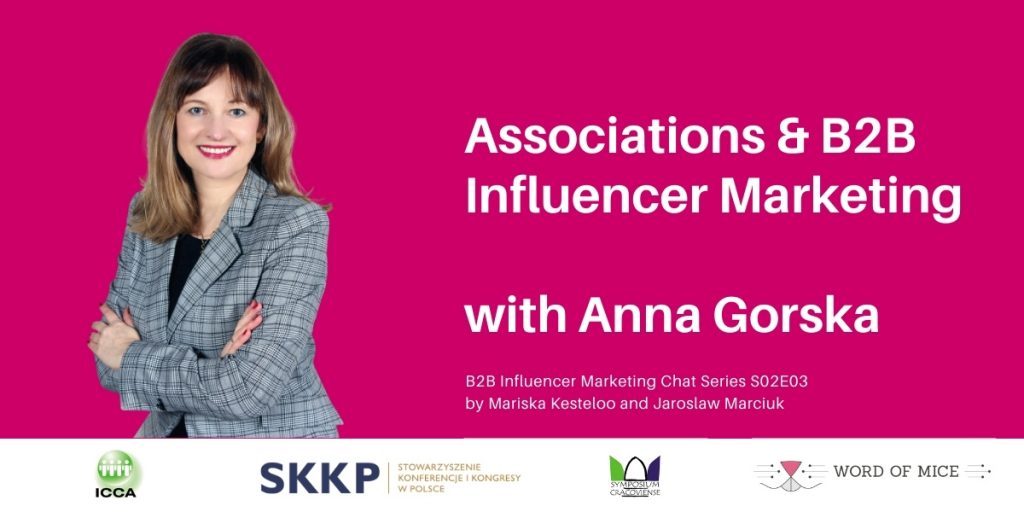
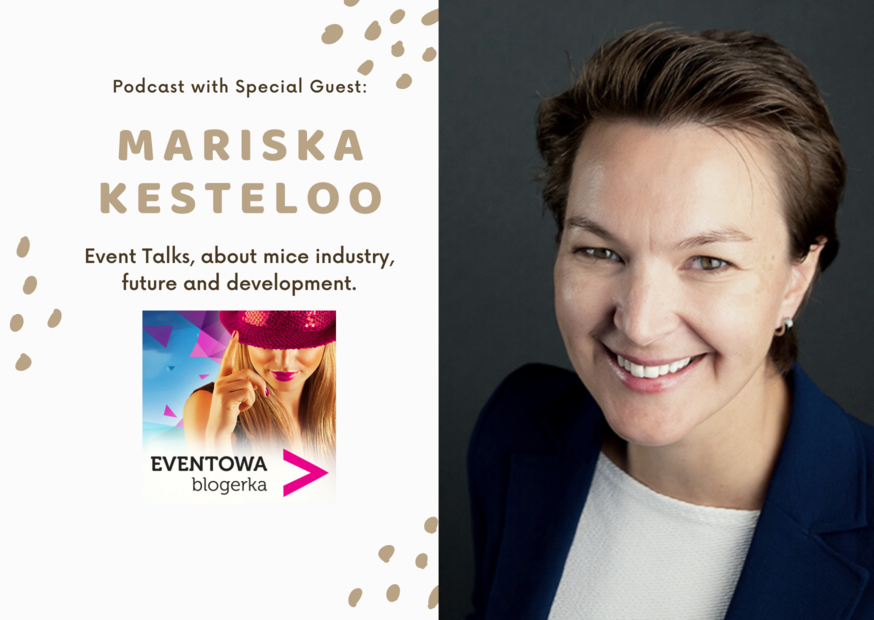
Event Talks Eventowa Blogerka Podcast with Mariska Kesteloo
In April and May, Mariska Kesteloo travelled around Poland in her camper. Agnieszka Ciesielska recorded a podcast with Mariska in Poznan. Agnieszka is an eventprof and blogger from Poland. You can visit Agnieszka`s blog here Eventowa Blogerka.
Agnieszka and Mariska’s talks are endless, especially as they are skimming around the discussion about the approach to the new reality, survival, and development in the coming months.
Listen to the conversation on Spotify, Apple Podcasts, Google Podcasts or here on Anchor.
After a few moments, the two ladies feel that they have found a common understanding. Their MICE market perception is similar, although the places where they live and work seem distant…We invite you to an interview recorded by Agnieszka Ciesielska with our own Mariska Kesteloo .
The conversation covers several important aspects, some of them still relevant:
- Agnieszka asks about #MariskaJourney Mariska’s trip to Poland in her camper, plans for the subsequent visits to other cities, and what she went through a year ago in her private life. It is a touching story of a woman who has lost the closest love of her life in an unequal struggle with the disease.
- Another Agnieszka`s question is about her observations on the constantly flowing refugees from Ukraine and how to continue to support them. The topic is already getting not very popular… our national optimism died out at the beginning of May. At that time, when we were recording our conversation, Polish people had a massive record of energy supporting our neighbours from Ukraine.
- Behind us is not an easy business time, pandemic, downtime, and no orders. Whether Poland or the Netherlands, where Mariska lives. Our reality has hit our businesses very hard. The impact on the meeting and event industry was huge at that time. Conflict escalation in Ukraine forced people to flee their homes, seeking safety, protection, and assistance. In the first five weeks, four million refugees from Ukraine crossed borders into neighbouring countries and most of them to Poland. How can the event industry be reborn in such a dynamic situation? What is Mariska’s advice? How to keep doing what we love continuously? How to find a golden means for life in such brutal pandemic or geopolitical times?
- At the beginning of pandemia Aga started providing online events on online avatar-based platforms avatarland.eu. Mariska company: Word of MICE is the first and only global influencer community for the MICE industry. How do our businesses change at different times of the year? What can we advise our colleagues in the MICE industry for the future?
- In the post-pandemic world, we can hear about a trend to redesign marketing strategies and information shared with tourism as new possibilities for Event Managers: new destinations, experiences, and services positively influence our clients? Are we ready to define it from the begging?
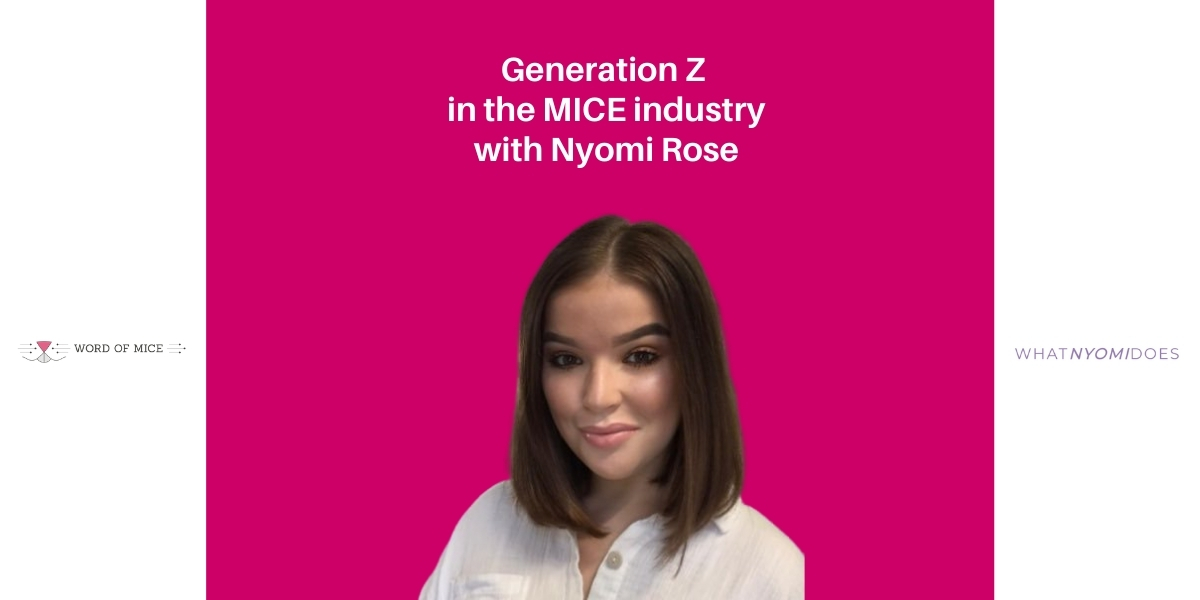
Generation Z is ready to change the MICE industry
Generation Z and MICE industry
Mariska: Sometimes I have a feeling that the MICE industry is running behind and we miss opportunities. And I think also now with TikTok so it would be great to see in the future that also destinations, technology partners, suppliers, trade shows, anyone who’s active within the industry, also the event planners, they will also focus more on the next Generation Z.
I think that we’re still missing that, for example if you go to a regular trade show. If IBTM was there now, on a normal way, then the average age I think it would be around 35 or older that you would see in Barcelona. You don’t see many young people normallyon events like these. So I think, one to embrace the next generation and want to feel them welcome. GenZ people approach is different, the way how they work is different. I think it’s very important to be on and at least watch TikTok and other social media platforms where young people are active.
Our guest, Nyomi Rose, talks about the next generation Z and MICE industry. She is very passionate about it. I think there’s also, and not only within our industry, a huge gap between the difference in generations. Nyomi, how do you see that evolving? Because you’ve mentioned a very funny example. You went for a job interview, and you got some standard questions, which I found really embarrassing from the person who did the interviews in the past. I think there’s again, same like TikTok, a lot of misconception and misperceptions about Generation Z.
Nyomi: I’m a young event professional, a lot of people don’t know how young I am. I’m 20 years old, turned 20 in August. I’ve done enough to really build a lot of my learning and development and skills through social media, which has really helped me. And especially when, like you were saying, I went to a job interview, and people usually don’t realise how young I am, and feel, then that I’m not very capable, because of my age, but then they bring me into the interviews, thinking how experienced I am.
You know, there’s still lots of different misconceptions about young people and the MICE industry. And I really just feel like, people need to embrace, meet embracing people. And I feel like it really starts with representation. If you really want to be forward thinking destination or event really bringing a wide audience andputting people on the panel speakers, you need to be open minded.
We are talking a lot about the future of the events industry. There’s no young people on the panel discussions on many events. I will say even more, there’s not a lot of young people who are signing up for the MICE industry trade shows tickets. People have got to realise why is that happening. Because we’re not being included? How do you communicate with Generation Z on social media? I hate to say it, but maybe you are doing boring content?
Mariska: It’s true. I’m a Dutch, so I am allowed to say it. I’m talking now in general. And like I said, it’s not adapted towards your generation, also that we still sense that and also the way how we reach out to you. And like you said, you don’t call and you prefer to speak with a chatbot or perhaps via Instagram chat function or messenger. And but it’s often not used in the regular communication from events and meeting planners.
Trade shows and events fitted to Generation Z
Jaro: Is your generation actually interested in trade shows and events in the MICE industry?
Nyomi: I feel like we can make people interested in anything, if we understand that generation. Sso for example, we have trade shows, if you go for example on TikTok, you can see that there’s a trending hashtag at the moment where people are showing the cars, trips, places, their makeup and so many different other topics. It’s such a variety and there’s trade show that are out discussing different things like that. And so I feel like it’s important that people really understand that we are interested if you make us interested, so instead of using content that is usually used for old, don’t want to say older, but you know from my experience, my experience generation.
Sorry, guys, but my experience generation I feel like they have their different type of content. They’re targeted differently, because that’s what interests them, that’s what brings them and you can’t then use that same type of content and then expecting people to then be interested. You’ve got to think creatively, you know, TikTok is all about inspiration, entertainment and education. It’s all in an authentic wat, where I feel like we can really see a lot of people who are trying to sell stuff.
You know, a lot of companies, for example in the UK, we’ve had a lot of discussion about the supermarkets who all came together for Christmas to share the hashtag, which was stand against racism. But the thing that they did with that is that they didn’t put any actual actionable things behind that campaign, they didn’t really actually engage with anybody, they just expected to put it out there. And for a lot of love to go, their way, and it didn’t necessarily go their way, because it was performative. You can’t expect to put things on them, people just go across and a lot of the younger generation are more analytical, we can really pick things apart.
We’re very good at looking back at the history of these companies finding out who was working in these companies, and really, dig deep into understanding who these people are. And I feel like, when we are creating content, we really got to make sure that it’s not just bare content, if we’re really wanting to bring young people in, really talk to them, offer them opportunities, embrace them into the actual event design, embrace them into the schedule, and go to work where they usually hang out, which is places like TikTok and Instagram, and which is doing a lot of video content.
And I feel like that is how we can make people interested. But like I said, you’ve got to make interesting content the way you actually understand. And like I mentioned at the beginning, if you’re saying, send me an email, and let’s book a session, I can tell you categorically that young people will not email you to be interested. Like we’re saying chat boxes, simple forums, where you don’t really necessarily have to talk to anybody. And that sounds like we’re a generation who don’t want to have human contact where we’re all about that. But we’re all about automation and things being simple, and not having to take the long way so I feel like that has really got to be understood as well.
Less is more
Jaroslaw: You mentioned that you’re overwhelmed by Facebook, right? There are so many features and options on Facebook. Do you look for more simple solutions in consuming content?
Nyomi: Yes, I was just gonna say that I completely agree. In fact, Facebook and a lot of other social media platforms are trying to be everyone and everything at the moment. But things like Facebook, the reason that then I feel that they’re not able to grow, it’s because they’re trying to do two things at once. And also the whole user design is just not appealing. Personally, I find it very confusing, there’s things at the bottom, things at the top and things splash in the middle of the screen, things pop up from the left to the right. And on Facebook nothing is very simple.
Whereas if you look on the TikTok platform interface, it’s got none of this sort of banners at the bottom, the video is actually the background for the whole time. There’s not much advertisement on TikTok (for now). You just got to follow ,like, comment, and share. And you can just swipe. How simple is that. And that’s why a lot of people love TikTok, because its simplicity.
MICE industry and social media in the era of COVID-19
Mariska: There’s a huge potential out there for TikTok and influencer marketing in the MICE industry. How do you see that evolving specifically for our industry, because the meetings and events industry is not so active. And we talked most about diversity inclusion, which is also of course, a hot topic in our industry. And how do you see that? Well, in your ideal world, what are your predictions? Or how do you see TikTok and events industry evolving? Would love to hear your opinion about that.
Nyomi: I feel like before COVID happened there was a lot of interest and MICE event professionals were actually really using social media and actually understanding it. And this was before TikTok the platform that we see it is now. And but the content that you can create on the Tik Tok platform, it’s so crucial just to actually, and that younger generation, because as much as we can say, you know, if we’ve got an event, and it’s for something that might not necessarily target the audience.
The younger audience can still learn from that. And then from those event professionals see behind the scenes we have, that they put together an incredible show, you know, meet industry speakers, that I feel like that the MICE industry is going to have to, it’s just, I feel like it, there’s not two ways about it, I feel like it’s going to have to use TikTok. And the way that the MICE industry is going to be able to do that is by opening the doors to younger people. People who know TikTok to come in and say, ‘Look, let me show you how to use this platform, and let me show you how this can work’.
I feel like that’s how the MICE industry can really start leveraging themselves. But I think it’s really important that when the mass industry just come on conferences, that they’re not creating content or creating advertisements, because like I was saying, TikTok is for Generation Z and the young people have so much content, and so much advertisement shown to everybody and think every action. Everybody can agree that every time you go on to all these other social media apps, or even when you just look at Google Search, you’ve got Facebook ads popping up, you’ve got Google Ads popping up, people trying to sell you stuff. You want to watch a YouTube video, and you’ve got an advertisement.
The importance of data
Mariska: I also like to TikTok because I’m Dutch, very straight to the point and we like very practical, easy to use tools. I want to mention something that you highlight is about data. And I think we need to have another conversation about data because we think we need 30 or 45 minutes to cover that topic. It’s really interesting that you do a research upfront with who you’re going to see and that you can see what kind of content the company even a person that you would speak within the company that you will say okay, over three years ago, he worked for another company which did not perform well or that company had a scandal or a claim or whatever. So it’s very interesting that you searched those data. And I think that’s still a very underestimated value within he MICE industry.
And like the younger generation, you grown up with social media, with the importance of those data and analytics. And I think that our generation is now with the digital world and being forced to be online, we’re now getting used to work with the data and analytics, but it’s still not at the forefront, and especially from meetings and event industry. I think that’s also perhaps one of the reasons why I’m not sure why they’re perhaps scared to use online platforms, or social media platforms like TikTok.
Nyomi: Yeah, and I feel like it’s very interesting, especially with the use of data, I feel like people are saying in the comments as well that a lot of the MICE industry are using traditional methods methods, like print media, emails and banners and things like that. And that sort of data, it can’t necessarily be as predictive, I can’t be as analytical as social media and digital media is, but in terms of TikTok`s algorithm, so there are data analytics, you know, if you create your TikTok account for a professional reasons, you can then see all your analytics and see, really, who’s watching when, when’s the best time to post etc.
But in terms of the general events industry, trying to use data more. I feel like, we’ve really got to make sure that we’re actually empowering our employees first, to really get them to understand the importance of data. So instead of just, putting out surveys, or things like that, we’ve got to be more creative with how we’re going to try and feed that data. And instead of asking simple questions, getting to know those people a lot more and connecting with them, is how you can really create, better data for you to then analyse, but then also using data, after your event to really help you with improvements.
And really just growing, as growning as a company or as an event, it’s really important that you actually look and analyse that data, you really manipulate it to understand why are people acting like this, or why people are interested in this, or that it’s really important that you can then look at that data to recognise there’s not a lot of young people here.
Now, why is this, is it because of these reasons xxx, and it’s important that you then create that data and then share it with people, too many people are keeping data to themselves. And people don’t realise that data is meant to be shared, obviously, with them legally. And but that data is meant to be shared to your community. And if you are sharing data that’s saying, ‘look where we recognise the gap here, like you know, come on community, let’s bring this, like, let’s go this new direction’. That’s what it’s supposed to be used first to help you improve and continually develop, but a lot of people don’t necessarily know how to do that. So that’s where it’s important that we are empowering people to use data, and not for it to be such a thing where it’s oh my gosh, like numbers and numbers, etc. It can be a lot, it can be a lot simpler than a lot of people usually make out to be.
New opportunities
Mariska: I think in general, it has a lot of opportunities. So hopefully now with the push of the younger generation, we’re able to share experiences and to see also how important our industry is. Because that’s actually also what it’s about, and why are so many impact on local economy, because so many suppliers and supply chain is involved in the entire industry. And it’s indeed by bringing people together.
We need to be an example. We need to be that inspiration for others also to follow us. I think sometimes we need to be not saying that leader but sometimes you need to take the lead.
Nyomi: Yeah, the importance that we’re all here to help the MICE industry grow. You know, we really need to make sure that the 2021 plan is to grow the industry and to make sure that we come back even stronger. And the only way we can do that is by bringing more people together. And not excluding different generations, but embracing each other, all of our different thoughts, ideas and experiences. I feel like that’s just so important for 2021. But also, I was gonna say, check out the Word of MICE TikTok Challenge, because we put out some really great advice and on how you can create that content on TiTok, and I believe you have to see change because we will have something coming out in the new year. So if you do want to understand how to Tik Tok, go look through that blog, and you can really sense that your tiktok journey, but I’m always here to help out.
